新概念英语第一册第117课Lesson117课文单词知识点
新概念英语第1册117课

JIM:Look! Everyone's in the garden. CAROL:Hello, Helen. Hello, Jim. TOM:Everybody wants to have lunch in the garden.
It's nice and warm out here. CAROL:Come and have something to drink. JIM:Thanks, Carol. May I have a glass of beer
v.
开玩笑
adj. 睡觉,睡着
n.
眼镜
Sophy Mike
Snow Jack
Rain
Tony
Jerry Bill
lily Betty
Linda Coco
HELEN:Isn't there anyone at home? JIM:I'll knock again, Helen.
Everything's very quiet.
4. —What did the teacher say just now? — Sorry. I didn’t catch it. I C B. will think C. was thinking D. had thought
5. When I came back yesterday evening, my brother ___C_____ his homework.
2. While I _____D______ TV, the bell rang. A. watch B. watched C. am watching D. was watching
3. —Why didn’t you answer my telephone yesterday?
新概念英语第一册自学笔记含课后练习答案:Lesson 117-118

新概念英语第一册自学笔记含课后练习答案:Lesson117-118新概念英语第一册117-118课课文重难点详解 further notes onthe text1.look for,寻找(强调动作过程);find,找到(强调寻找的结果)。
2.tommy had already swallowed them! 汤米已经把硬币咽了下去!句中用了过去完成时形式 had swallowed。
过去完成时用来表示过去两个动作中发生在前的那个动作。
显然,句中咽下硬币的动作发生在夫妇俩能够把硬币从汤米手中抢过来之前。
3.later that morning,那天上午的晚些时候。
later是副词late的比较级。
4.any changechange是个多义词,既有“零钱”的意思,也有“变化”的意思。
此处既可指“硬币”;也可指“情况的变化”。
这是双关(pun /p)n/)修辞法。
新概念英语第一册117-118课语法知识点 grammar in use过去实行时构成: be的过去式+现在分词。
过去实行时表示过去某时正在实行的情况或动作。
过去实行时和一般过去时经常在同一个句子里使用。
过去实行时表示过去正在实行的情况或动作,一般过去时则表示比较短暂的动作或事件。
过去实行时的时间状语从句一般由when,while及(just)as等来引导,说明主句中动作发生时的背景。
此外,可用 while或 at the time等强调同时实行的两种或几种动作。
请看例句:when i was doing the housework, my husband telephoned mefrom the office.当我正在干家务时,我丈夫从办公室打电话给我。
while i was listening to the stereo, my mother came into the room.我正在听立体声节目时,我母亲进房间了。
just as she was cleaning her shoes, george knocked at the door.她正在擦鞋时,乔治敲门了。
新概念课堂笔记-第一册-Lesson-117-118

<新概念英语课堂笔记第一册Lesson 117-118dining room【用法】饭厅【扩展】dining hall 大餐厅,食堂dining car 餐车dining table 餐桌coin【用法】n. 硬币【词组】coin box 投币箱【扩展】note n. 纸币 = paper moneyswallow【用法】v. 吞下,咽下;抑制,使不流露;n. 燕子【词组】at a swallow 一口swallow up 吞没;淹没;消失在……中【例句】Tommy haswallowed the coins. 汤米把硬币吞下去了。
I tried hard to swallow my doubts. 我强忍着不露出怀疑的神色。
She swallowed a smile and sat there still. 她忍住没笑,静静地坐在那里。
later【用法】adv. 后来adj. 后来的,较晚的,晚年的,末期的【词组】see you later 再见ten years later 十年后sooner or later 迟早later on 以后(口)【例句】He found happiness in later life. 他在晚年找到了幸福。
Can you talk about it later on. 我们能否以后再谈论这件事 He will have to go there sooner or later. 他早晚得去。
【辨析】late, later 和latest○ late作形容词,表示“迟的”“晚期的”“新近”的意思,也可作副词,表示“晚、迟、在晚期”。
比如:She was late for school yesterday. 她昨天上学迟到了。
He woke up late. 他醒的晚了。
○ later可作为late的比较级形式,或者作时间副词表示“随后,稍后”。
比如:She came here later than me. 她比我到这儿晚。
裕兴新概念第一册学习笔记(117-120)
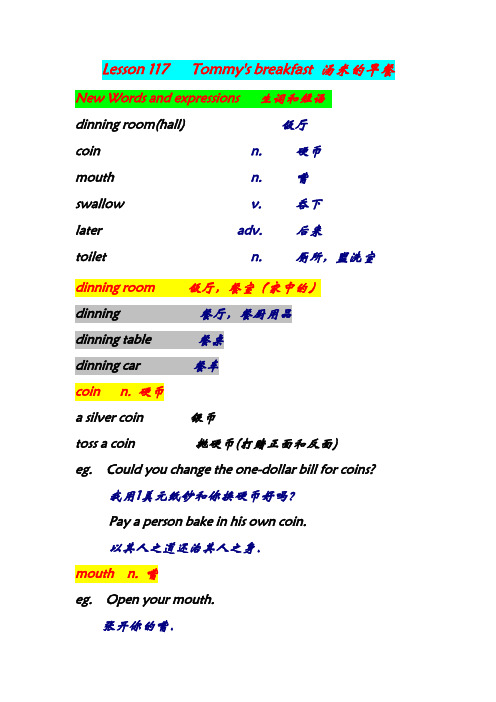
Lesson 117 Tommy's breakfast 汤米的早餐New Words and expressions 生词和短语dinning room(hall) 饭厅coin n. 硬币mouth n. 嘴swallow v. 吞下later adv. 后来toilet n. 厕所,盥洗室dinning room 饭厅,餐室(家中的)dinning 餐厅,餐厨用品dinning table 餐桌dinning car 餐车coin n. 硬币a silver coin 银币toss a coin 抛硬币(打赌正面和反面)eg. Could you change the one-dollar bill for coins?我用1美元纸钞和你换硬币好吗?Pay a person bake in his own coin.以其人之道还治其人之身.mouth n. 嘴eg. Open your mouth.张开你的嘴.-Don’t talk with your mouth full!-嘴里塞满食物时不要说话!Shut your mouth!(口语)闭嘴It sounds funny in your mouth.这种话由你的口中说出来,听起来就很可笑。
by word of mouth 口头上from hand to mouth 勉强糊口from mouth to mouth 口口相传have a big mouth 大嘴巴,嘴不严swallow1) v. 吞…, 咽…eg. He swallowed (up) the medicine with water.他把药和水一起吞下1) n. 一口(一口的量)take a swallow of beer 喝一口啤酒at one swallow 一饮而尽★swallow v. 吞下①v. 吞下,咽下Tommy had swallowed the coins.汤米已经吞下了那硬币.②v. 抑制,使不流露I tried hard to swallow my doubts.我强忍着不露出怀疑的神色。
新概念英语第一册Lesson117~122课文注释

新概念英语第一册Lesson117~122课文注释新概念英语第一册Lesson117~118课文注释1 在英文中表示过去某时正在进行的动作,要用过去进行时。
与现在进行时相比,过去进行时的区别就在于要用be 的过去式。
过去进行时的例子有:When my husband was going into the dining room this morning…;While we were having breakfast…等。
2 them all, all用来强调每一个硬币。
从语法上来讲,all是them的同位语。
紧跟在一个名词或代词后,进一步说明前面名词或代词是谁或什么东西的名词或代词,叫同位语。
3 our little boy, Tommy.Tommy是boy的同位语。
4 put them both…both是them的同位语。
5 we both...both是we的同位语。
6 Tommy had already swallowed them!句中用了过去完成时。
过去完成时用来表示两个动作中,发生在前的那个动作。
显然,句中“咽下硬币”的动作发生在夫妇俩能够把硬币从汤米手中抢过来之前。
7 later that morning 那天上午的晚些时候。
later是副词late的比较级。
8 any changechange是个多义词,既有“零钱”的意思,也有“变化”的意思。
此处既可指“硬币”,亦可指“情况的变化”。
这是“双关”修辞法。
新概念英语第一册Lesson119~120课文注释1 as quickly as they could是状语,修饰ran away。
第1个as是副词,第2个as是连词.引导比较状语从句。
could后省略了run,是“能跑多快就跑多快”的意思。
2 What’s up?干什么?有什么事?3 he calledhe指parrot。
英语中,动物有时用he或she代替,是“拟人”的写法。
(完整word版)新概念英语117课讲义
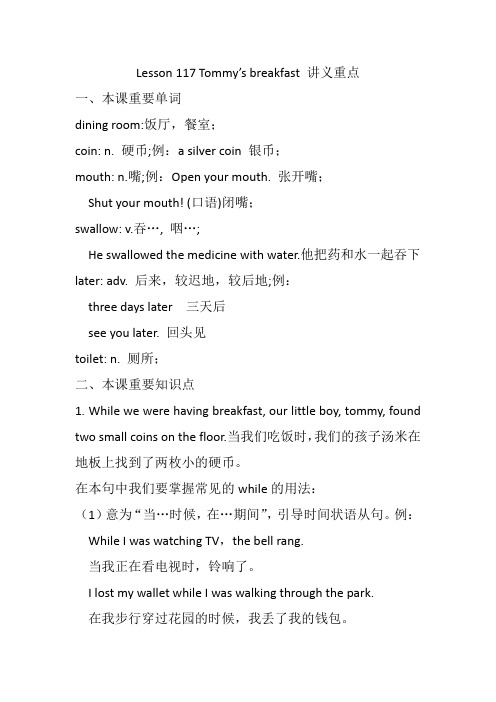
Lesson 117 Tommy’s breakfast 讲义重点一、本课重要单词dining room:饭厅,餐室;coin: n. 硬币;例:a silver coin 银币;mouth: n.嘴;例:Open your mouth. 张开嘴;Shut your mouth! (口语)闭嘴;swallow: v.吞…, 咽…;He swallowed the medicine with water.他把药和水一起吞下later: adv. 后来,较迟地,较后地;例:three days later 三天后see you later. 回头见toilet: n. 厕所;二、本课重要知识点1. While we were having breakfast, our little boy, tommy, found two small coins on the floor.当我们吃饭时,我们的孩子汤米在地板上找到了两枚小的硬币。
在本句中我们要掌握常见的while的用法:(1)意为“当…时候,在…期间”,引导时间状语从句。
例:While I was watching TV,the bell rang.当我正在看电视时,铃响了。
I lost my wallet while I was walking through the park.在我步行穿过花园的时候,我丢了我的钱包。
(2)意为“虽然,尽管”,引导让步状语从句。
例:While it was late,he went on working.虽然很晚了,但他还在继续工作。
While he is in poor health,he works hard.虽然他身体不好,但他还是努力工作。
2. We both tried to get the coins, but it was too late.我们都试图把两枚硬币拿出来,但太迟了。
在本句中我们要掌握all与both的用法及区别:“全部”。
新概念英语第一册Lesson117-118笔记(语法点+配套练习+答案)

put ... into ...
把...放到
have/has been to
曾去过某地
四、语法解析
1.现在进行时:说话此刻正在发生
结构:be (am/is/are) + v.ing
时间标志词:Look! Listen! now, at the moment
练习:
1.One of themis taking(take) photos for us now.
11.Didyoufinish(finish) your homework yesterday?
12.Her motherdidn’t give(not give) the girl any present.
13.When hewent(go) back to England, hewass(be) very tired.
The childrenwereallhappy.
Bothof the twins wanted to go to the theatre.
Allof my classmates are invited to my party.
three times三次
现在完成时的标志词
twice两次
once一次
have/has been to去过某地,已回
have/has gone to去了某地,未回
My father isn't at home, hehas gone toBeijing.
Mr Wang isn't here.Hehas gone toQingdao.
My fatherhas been toBeijing twice.
Ihaveneverbeen tothe Great Wall.
新概念Lesson 117 Tommy's breakfast
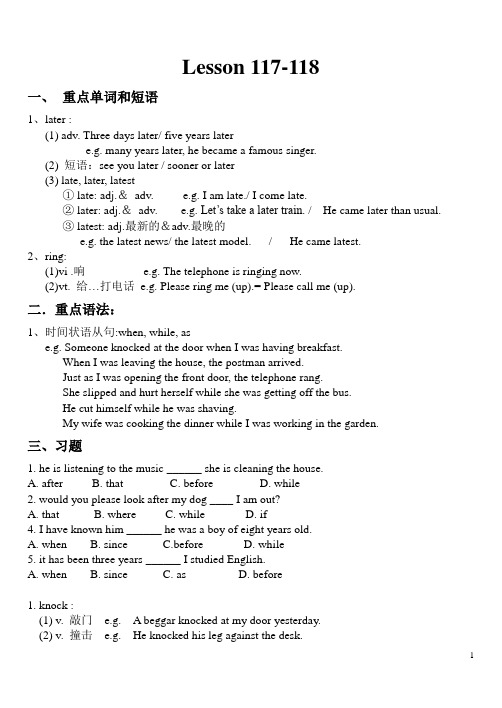
Lesson 117-118一、重点单词和短语1、later :(1) adv. Three days later/ five years latere.g. many years later, he became a famous singer.(2) 短语:see you later / sooner or later(3) late, later, latest① late: adj.&adv. e.g. I am late./ I come late.② later: adj.&adv. e.g. Let’s take a later train. / He came later than usual.③ latest: adj.最新的&adv.最晚的e.g. the latest news/ the latest model. / He came latest.2、ring:(1)vi .响 e.g. The telephone is ringing now.(2)vt. 给…打电话e.g. Please ring me (up).= Please call me (up).二.重点语法:1、时间状语从句:when, while, ase.g. Someone knocked at the door when I was having breakfast.When I was leaving the house, the postman arrived.Just as I was opening the front door, the telephone rang.She slipped and hurt herself while she was getting off the bus.He cut himself while he was shaving.My wife was cooking the dinner while I was working in the garden.三、习题1. he is listening to the music ______ she is cleaning the house.A. afterB. thatC. beforeD. while2. would you please look after my dog ____ I am out?A. thatB. whereC. whileD. if4. I have known him ______ he was a boy of eight years old.A. whenB. sinceC.beforeD. while5. it has been three years ______ I studied English.A. whenB. sinceC. asD. before1. knock :(1) v. 敲门 e.g. A beggar knocked at my door yesterday.(2) v. 撞击 e.g. He knocked his leg against the desk.2. quiet : e.g. I like to live a quiet life in the country.(1) adj. a quiet night/ place/ room/ life/ child3. impossible:(1) im-否定前缀polite-- impolite(2) It is impossible for sb. to do sth.e.g. It’s impossible for me to get there before 8.It’s impossible for him to climb such a high mountain.4. invite:(1) invite sb. to do sthe.g. We invited him to have dinner. / She invited him to go fishing with her.(2) invite sb. to s.p./ sth.e.g. I invite my friends to dinner this evening. / They invite some writers to the meeting.(3) invitation n. e.g. I got an invitation to the party.5. joke : n.(1) play a joke on sb.(2) tell a joke(3) v. I am only joking.6. asleep:(1)表语形容词,只能做表语,不做定语的形容词be asleep /fall asleep e.g. Everyone is asleep.(2)表语形容词:ill, well, asleep, awake二、重点句型:1、复合不定代词:①复合不定代词做主语谓语动词用单数e.g. Nothing is impossible. / There is something interesting in today’s newspaper.②形容词修饰复合不定代词要后置e.g. I have something important to tell you.There is something wrong with my bag. / Anything else?三、习题1. Suddenly he came in and said he had _________ to tell the class.A. anything importantB. important everythingC. something importantD. important something2. _________ draws so well as Tom.A. NobodyB. SomebodyC. EverybodyD. Anybody3. Is there _________ new in today’s newspaper?A. anything elseB. else anything c. something else D. else everything4. The box is empty. There is __________ in it.A. anythingB. nothingC. everythingD. something5.There _________ wrong with my computer.A. are somethingB. are anythingC. is anythingD. is something6. I am not busy at the moment. I haven’t _________ to do.A. somethingB. everythingC. nothingD. anything7. Would you like _______ to drink?A. somethingB. anythingC. nothingD. everything8. I hope ___________ goes well.A. somethingB. anythingC. nothingD. everything9. This question is so easy that ________ can answer it.A. nobodyB. anyoneC. no oneD. someone10. She is too tired to go __________.A. somewhereB. everywhereC. other whereD. anywhere。
新概念英语第一册课文翻译及学习笔记Lesson117知识分享

新概念英语第一册课文翻译及学习笔记Lesson117【课文】When my husband was going into the dining room this morning, he dropped some coins on the floor.There were coins everywhere. We looked for them, but we could not find them all.While we were having breakfast, our little boy, Tommy, found two small coins on the floor.He put them both into his mouth. We both tried to get the coins, but it was too late. Tommy had already swallowed them!Late that morning, when I was doing the housework, my husband phoned me from the office.'How's Tommy?' he asked. 'I don't know,' I answered,'Tommy's been to the toilet three times this morning, but I haven't had any change yet!'【课文翻译】今天早晨我丈夫走进饭厅时,把一些硬币掉在地上了。
到处都是硬币。
我们虽然找了,但没有把它们全部找到。
正当我们吃早饭时,我们的小男孩汤米在地上找到两枚小硬币。
他把这两枚硬币全都放进嘴里。
我们俩都试图把这两枚硬币拿出来,但太迟了。
汤米已经把硬币咽了下去!那天下午的晚些时候,当我正做家务时,我丈夫从办公室打来电话。
新概念117-118课(第一课时)
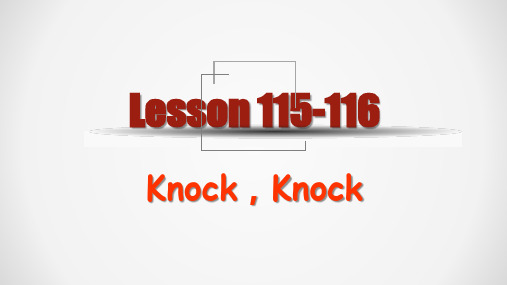
Let’s try the back door. Look! __E_v_e_ry_o_n_e_’s____in the garden.
6/16/2021
Hello, Helen. Hello, Tom. _E_v_e_r_y_b_o_dy___wants to have lunch in the garden. It’s_n_i_c_e_a_n_d_w__ar_m__o_u_t_h_e_r_e___.
any 任何
anyone 任何人 anybody 任何人 anything 任何事情 anywhere 任何地方
[any-用于疑问句与否定句中]
some 一些
someone 某人 somebody 某人 something 某件事情 somewhere 某个地方
Everyone is asleep. Everybody is asleep.
8. let’s try the back door.
the front door
try v. 尝试,试图,努力 try to do sth. 努力做某事 try doing sth.表示尝试着做某事
6/16/2021
9. It's nice and warm out here. 外面挺暖和。 这里的 nice and 相当于 very, 用于形容词及副词之前, 表示肯定或加强语调的意思。译为“挺......的”例如:
Lesson 115-116
Knock,Knock
复习
Review
PART 01 词汇复习 PART 02 语法复习 PART 03 重点知识复习
words
单词必须积累
★ anyone / eniw n/
新概念英语lesson117
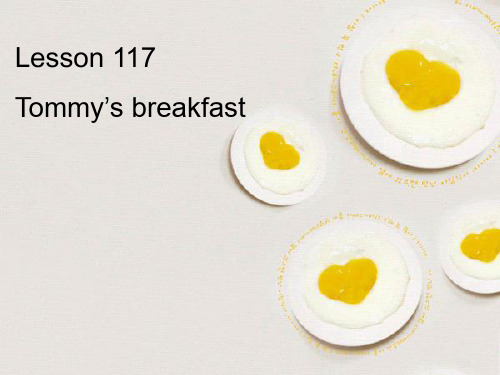
Why is an empty purse always the same? There is no change in it. (零钱,变化 零钱, 零钱 变化)
Translation
1)别把你的秘密告诉她。她说话嘴松。(秘密 secret) )别把你的秘密告诉她。她说话嘴松。(秘密 。( ) 2)昨天,当电话响起时,我正在做饭。 )昨天,当电话响起时,我正在做饭。 3)当我回到家的时候,他没有在读报纸。 )当我回到家的时候,他没有在读报纸。 4)昨天下午三点半,你正在卧室里读书吗? )昨天下午三点半,你正在卧室里读书吗?
‘How's Tommy?’he asked. ‘I don't know,’ I answered, ‘Tommy's been to the toilet three times this morning, but I haven't had any change yet!’
“汤米怎么样?”他问。 “我不知道,”我回答说, 汤米怎么样? 他问。 我不知道, 我回答说, 汤米怎么样 今天上午汤米去了3次厕所了 次厕所了, “今天上午汤米去了 次厕所了,但我还没看到硬 币!”
Lesson 117 Tommy’s breakfast
New words and expressions
dining room coin mouth swallow later toilet
饭厅 n.硬币 硬币 n.嘴 嘴 v.吞下 吞下 adv.后来 后来 n. 厕所,盥洗室 厕所,
dining room dining table sitting room / living room bedroom kitchen balcony garden
新概念一117,118知识点整理
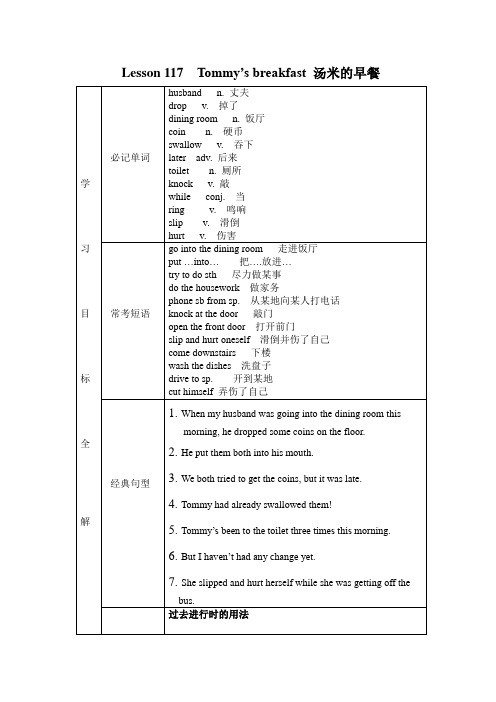
Lesson 117 Tommy’s breakfast 汤米的早餐学习目标全解必记单词husband n. 丈夫drop v. 掉了dining room n. 饭厅coin n. 硬币swallow v. 吞下later adv. 后来toilet n. 厕所knock v. 敲while conj. 当ring v. 鸣响slip v. 滑倒hurt v. 伤害常考短语go into the dining room 走进饭厅put …into…把….放进…try to do sth 尽力做某事do the housework 做家务phone sb from sp. 从某地向某人打电话knock at the door 敲门open the front door 打开前门slip and hurt oneself 滑倒并伤了自己come downstairs 下楼wash the dishes 洗盘子drive to sp. 开到某地cut himself 弄伤了自己经典句型1.When my husband was going into the dining room thismorning, he dropped some coins on the floor.2.He put them both into his mouth.3.We both tried to get the coins, but it was late.4.Tommy had already swallowed them!5.Tommy’s been to the toilet three times this morning.6.But I haven’t had any change yet.7.She slipped and hurt herself while she was getting off thebus.过去进行时的用法重点语法定义:表示过去某一时刻或者某个时间正在进行的动作。
新概念第一册课文翻译及知识点【Lesson115、117、119】

【导语】新概念英语作为⼀套世界闻名的英语教程,以其全新的教学理念,有趣的课⽂内容和全⾯的技能训练,深受⼴⼤英语学习者的欢迎和喜爱。
为了⽅便同学们的学习,为⼤家整理了⾯的新概念第⼀册课⽂翻译及学习笔记,希望为⼤家的新概念英语学习提供帮助!Lesson115 【课⽂】 HELEN: Isn't there anyone at home? JIM: I'll knock again, Helen. Everything's very quiet. I'm sure there's no one at home. HELEN: But that's impossible. Carol and Tom invited us to lunch. Look through the window. HELEN: Can you see anything? JIM: Nothing at all. HELEN: Let's try the back door. JIM: Look! Everyone's in the garden. CAROL: Hello, Helen. Hello, Jim. TOM: Everybody wants to have lunch in the garden. It's nice and warm out here. CAROL: Come and have something to drink. JIM: Thanks, Carol. May I have a glass of beer please? CAROL: Beer? There's none left. You can have some lemonade. JIM: Lemonade! TOM: Don't believe her, Jim. She's only joking. Have some beer! 【课⽂翻译】 海伦:家⾥没有⼈吗? 吉姆:海伦,我再敲⼀次。
新概念1册 117课 课件加练习
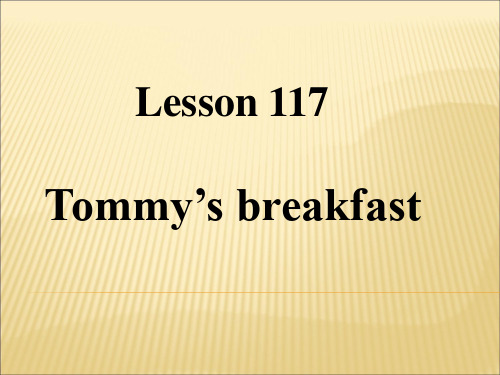
She was looking for her passport yesterday. 昨天她在找他的护照。 Did she find it? 找到了吗? Yes,she find it under the chair. 找到了,他是在椅子地下找到的。 3.While we were having breakfast, our little boy , Tommy, found two small coins on the floor.正当我们吃早饭时,我 们的小男孩汤米在地上找到了两枚小硬币。 【分析】主从复合句,while 引导时间状语从句, Tommy 作our little boy 的同位语。 【例句】While she was cleaning the room, her husband telephoned her. 她正在打扫房间的时候,她的丈夫来电话了。
Lesson 117
Tommy’s breakfast
单词学习 1.mouth n.嘴 张开你的嘴。 Open your mouse. Don’t talk with your mouth full! 嘴里塞满食物时不要说话!
Shut your mouth! (口语)闭嘴!
【惯】 from mouth to mouth 口口相传地 The story was passed on from mouth to mouth. 这个故事口口相传。 from hand to mouth 勉强糊口。 Life was too hard for my grandfather before liberation. He could just live from hand to mouth. 解放前爷爷的生活境况很差,只能勉强糊口。
【注释】1.go into“走进”,强调进入的动作,反义词go out of走出· · · · 2.drop,掉下: Be careful!Don’t drop the vase. 小心,别把花瓶摔了。 drop,丢失,丢掉: I dropped my pen on the way home. 回家路上我把笔弄丢了。
新概念一L117-120单词讲义

Lesson 117 Tommy's breakfast★swallow ①v. 吞下,咽下Tommy had swallowed the coins.②v. 抑制,使不流露I tried hard to swallow my doubts. 我强忍着不露出怀疑的神色。
She swallowed a smile and sat there still.她忍住没笑,静静地坐在那里。
③v. 吞并;侵吞Our company was swallowed up by an American company last year.我们公司去年被一家美国公司吞并了。
Nazi Germany nearly swallowed up the whole Europe in World War II.第二次世界大战中,纳粹德国几乎吞并了整个欧洲。
dinning room(hall)饭厅living room bedroom storeroombalcony[ˈbælkəni]kitchen base room toilet厕所,盥洗室coin n. 硬币[语法]过去进行时概念: 1、在过去某个特定的时间正在进行或发生的动作。
2、当过去的一个动作发生的时候另外一个动作正在进行。
结构:主语+ was(were)+ doing S+ wasn’t(weren’t) +Ving Was(Were)+S +Ving?连接词:when 当……的时候;while 当……的时候(强调两个动作的同时进行)when和while大多数情况下可互换,当强调两个动作的同时进行和发生,只能用while。
just as 正当……at this time 这个时候I was walking in the street at this time last week.时间状语从句主句放前面,用连接词连接,时间状语从句放前面时,要用逗号隔开。
新概念一册 lesson 117

词汇
词汇
• Later adv.后来 • 就是later的比较级
• 用于句首,叙述性语言,“之后”用作过去时居多 • 用于句尾,“一会”,将来时居多。
• • • •
例句:后来,我学会了如何去爱。 Later, I finally learnt how to love. 一会打给你。 I will talk to you later.
语言点
• 过去进行时 • 概念:过去某一时刻或某一段时间内进行 或者发生的动作。 • 结构: was/ were +V-ing • 例句:他昨天下午正在游泳。 He was swimming yesterday afternoon.
语言点
• 标志符号:与过去时相同,但是进行时要靠上 下文意义判断。 • 常见的:last 表示过去 wபைடு நூலகம்en,while,as 表示进行 当……的时候 例句:当我正在读书的时候,他正在看电视。
词汇
词汇
• Coin n. 硬币(不一定是钱) v. 制造,塑造 例句: 让我们一起塑造他。 Let’s coin him together.
词汇
• Mouth n. 嘴,河流入海口 • 注意读音,th要咬舌头 lips
• Swallow v. 1. 吞下 2.掩饰,抑制 例句:他把一粒葡萄放入嘴里, 整个吞了下去。 He put a grape into his mouth and swallowed it whole. 他抑制住自己的悲痛。 He swallows his sadness.
新概念一册 Class C
Lesson 117 Tommy’s breakfast
• Dinning room 饭厅
• • • • Living room 客厅 Bathroom 洗澡间 Toilet 厕所 Washing room 洗澡间 Bedroom 卧室 Kitchen 厨房 Laundry 洗衣房
新概念英语第一册第117课Lesson117课文单词知识点
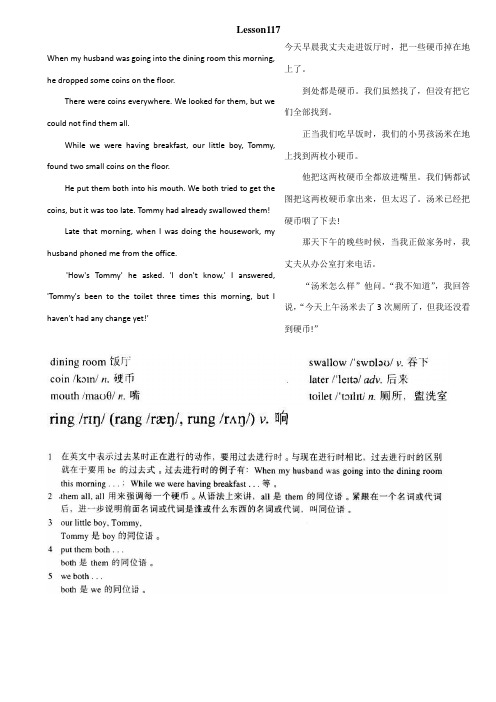
Lesson117When my husband was going into the dining room this morning,he dropped some coins on the floor.There were coins everywhere. We looked for them, but wecould not find them all.While we were having breakfast, our little boy, Tommy,found two small coins on the floor.He put them both into his mouth. We both tried to get thecoins, but it was too late. Tommy had already swallowed them!Late that morning, when I was doing the housework, myhusband phoned me from the office.'How's Tommy' he asked. 'I don't know,' I answered,'Tommy's been to the toilet three times this morning, but Ihaven't had any change yet!'今天早晨我丈夫走进饭厅时,把一些硬币掉在地上了。
到处都是硬币。
我们虽然找了,但没有把它们全部找到。
正当我们吃早饭时,我们的小男孩汤米在地上找到两枚小硬币。
他把这两枚硬币全都放进嘴里。
我们俩都试图把这两枚硬币拿出来,但太迟了。
汤米已经把硬币咽了下去!那天下午的晚些时候,当我正做家务时,我丈夫从办公室打来电话。
“汤米怎么样”他问。
- 1、下载文档前请自行甄别文档内容的完整性,平台不提供额外的编辑、内容补充、找答案等附加服务。
- 2、"仅部分预览"的文档,不可在线预览部分如存在完整性等问题,可反馈申请退款(可完整预览的文档不适用该条件!)。
- 3、如文档侵犯您的权益,请联系客服反馈,我们会尽快为您处理(人工客服工作时间:9:00-18:30)。
Lesson117
When my husband was going into the dining room this morning, he dropped some coins on the floor.
There were coins everywhere. We looked for them, but we could not find them all.
While we were having breakfast, our little boy, Tommy, found two small coins on the floor.
He put them both into his mouth. We both tried to get the coins, but it was too late. Tommy had already swallowed them!
Late that morning, when I was doing the housework, my husband phoned me from the office.
'How's Tommy?' he asked. 'I don't know,' I answered, 'Tommy's been to the toilet three times this morning, but I haven't had any change yet!' 今天早晨我丈夫走进饭厅时,把一些硬币掉在地上了。
到处都是硬币。
我们虽然找了,但没有把它们全部找到。
正当我们吃早饭时,我们的小男孩汤米在地上找到两枚小硬币。
他把这两枚硬币全都放进嘴里。
我们俩都试图把这两枚硬币拿出来,但太迟了。
汤米已经把硬币咽了下去!
那天下午的晚些时候,当我正做家务时,我丈夫从办公室打来电话。
“汤米怎么样?”他问。
“我不知道”,我回答说,“今天上午汤米去了3次厕所了,但我还没看到硬币!”
【知识点讲解】
1. 翻译句子:
1) 听!谁在敲门呢?
Listen! Who is knocking at the door?
2) 他打算今晚请你吃晚饭。
He is going to invite you to dinner.
2. A: 我不能跟刘翔跑得一样快。
B: 我也不能。
A: I cannot run as fast as Liuxiang. B:Neither can I.
A: Tom 很喜欢吃巧克力。
B: 我妹妹也很喜欢吃。
A: Tom likes eating chocolate very much. B: So does my sister.
(一)单词扩展
1)dinning room 饭厅dine v. 吃饭,用餐dinning room (a room for dining) 就餐的房间
toilet 厕所,盥洗室
现在我们用英语来描述一下我们的家:living room 客厅/起居室bedroom 卧室dining room 饭厅garden 花园
kitchen #FormatImgID_5# 厨房toilet #FormatImgID_6# 厕所balcony #FormatImgID_7# 阳台
2)toilet n. 厕所,盥洗室
厕所,你也许马上就把WC脱口而出。
WC,是water closet(水箱)的缩写,但wc是一种很粗俗的表达方式(相当于中国乡村常在厕所中标“大便处”“小便处”,是英美等国一二百年前使用的,现在一般不用WC,而使用Toilet等较文雅的词。
在美国,通常会成为Restroom 或者Bathroom,有些地方也用Washroom。
3)mouth n. 嘴巴现在说说人体的五官,从上到下,分别是,眉毛(eyebrows),眼睛(eyes),鼻子(nose),耳朵(ears),嘴巴(mouth)这五部分。
同时,我们再来学一个俚语,big mouth 大嘴巴(说话管不紧,容易泄漏秘密)如:他说话嘴松。
He has a big mouth.
(二)语法讲解
过去进行时表示在过去某一时刻或某一段时间内进行或发生的动作。
其形式为was /were + V-ing。
常与表示过去的时间状语连用,如:last night, last Saturday等;或者与when, while, as 引导的过去时间状语连用。
1. 过去进行时由“助动词was/were + 现在分词”构成例如: We were having supper when the phone rang. 我们正在吃晚饭时电话响了。
2. 过去进行时的否定式由“was/were not +现在分词”构成。例如: This time yesterday Jack was not watching TV. He was repairing his bike. 昨天这个时候,杰克不是在看电视,而是在修理自行车。
3. 过去进行时的疑问式由“was/were + 主语+ 现在分词?”构成。例如: Were you playing basketball at four yesterday afternoon? 昨天下午四点你们在打篮球吗?
(三)感受英语
让我们来感受一下英语中的一语双关。
通过学习,我们知道这篇小文章讲述的是,一对夫妇的小儿子误食硬币的家庭小事故。
故事的结尾时丈夫打来电话问妻子,儿子怎样了?妻子回答是他今天去了三次厕所,但我现在还没有看到change。
change n.零钱,改变。
在这里,我们既可以理解为零钱(被吞食的硬币)也可以理解为“改变”(起色)。
所以change一词,在文章中,是一语双关呢。
